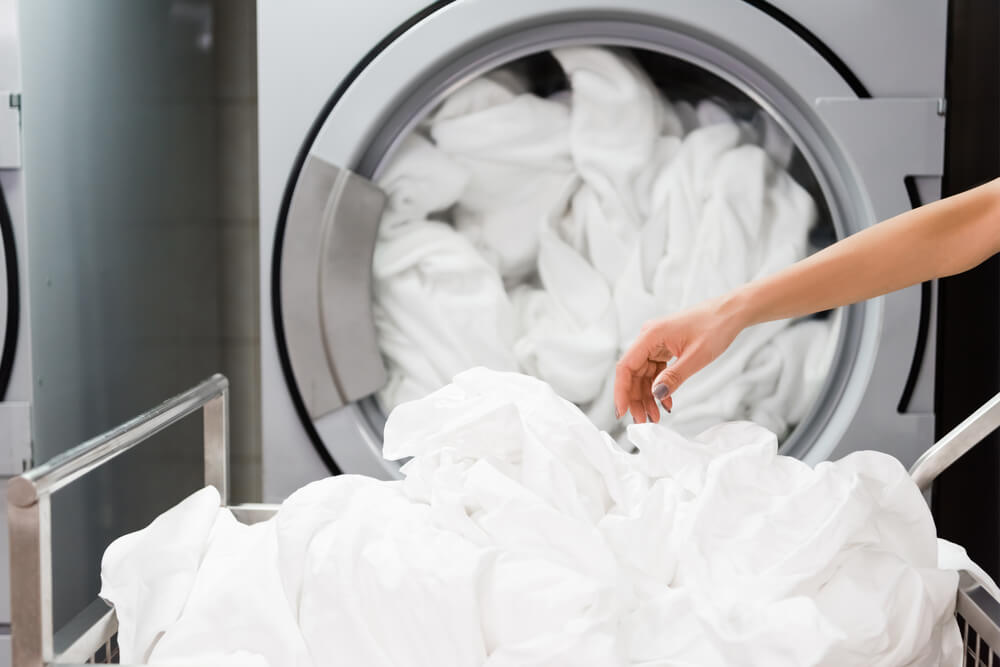You have just bought – or are planning to buy – a set of new sheets. However, even though they are still brand new in their packaging, you think you once heard that you should wash new sheets before putting them on the bed they are intended for. But can that possibly be right, given that they should have come from the factory sparkling clean?
According to many experts however, the answer is yes, you should wash new sheets before their first use to get rid of the bad chemical smell, to make them less itchy and scratchy and remove unwanted particles like dust and dirt.
There are several reasons that this advice is offered, and it is the most important of those that we are going to take a closer look at here.
[no_toc]
Are new bed sheets clean?
Obviously, you would expect that a brand-new set of bedsheets would be spotless. And they are. But cleanliness is not the reason that you should consider giving them a wash before you make the bed with them, as we will explain.
Can new bed sheets make you itchy?
Even if they are new, some bed sheets might be crafted from a material that makes some people itchy – especially if they have sensitive skin and/or a skin condition like eczema.
In general, those with sensitive skin are usually advised to stick to sheets made from natural organic materials, as artificial fibers can indeed make you itchy and, for some, even very dark artificial dyes can lead to itchiness or redness. But for everybody, sometimes even organic choices like cotton or bamboo can be so stiff when they are new, they cause itchiness (more on that in a moment).
Can new sheets have bed bugs?
That would be exceedingly rare. Bed bugs ‘jump’ from one place to another, so in theory, if bed bugs were present in the factory where the sheets were packed, they could make their way into the packaging, but that is almost unheard of.
Can you use bed sheets without washing?
You sure can, as they will be nice and clean, and many people do. However, by not washing your new bed sheets you may miss out on some of the benefits of doing so we are going to take a closer look at next.
Reasons why you should wash new sheets

So, we have told you that experts – and we agree – think you should wash new sheets before using them. But we should explain why, especially as on the face of it doing so sounds a little crazy.
You’ll make them softer
New sheets – especially new cotton sheets – can be very stiff when they come out of the package. Stiff sheets are not very comfortable to sleep under, and as we mentioned earlier, they can even be a little itchy.
You’ll get rid of chemicals
When sheets are manufactured, they are designed to look great in the package. Almost all sheets come in a transparent plastic package so you can get a ‘sneak peek’ at what you are getting, but to ensure they look great they are often treated with laundry chemicals.
These chemicals are safe, but you still do not really want to sleep with them surrounding you, especially if you have sensitive skin or you’re buying sheets for a newborn. This is true for others in your family, especially babies and toddlers whose skin is super sensitive.
These chemicals can also smell rather strong, which may not be to most people’s taste either. Laundering your sheets will wash away these additives and ensure your new sheets smell great when you finally put them on your bed.
You won’t get stained skin
Very dark sheets usually contain a lot of dye, even the organic ones. Some of that dye is designed to be washed away. It is not a fault in the sheets, it’s the way they are made.
However, if you do not give your sheets a wash before using them for the first time, the chances are good that you could wake up with skin the same color as your sheets, as your body heat will cause the excess dye to transfer onto your skin. And, unless you are deliberately going for the alien look, blue skin is probably not a look you will love. That dye can be extremely hard to get off too, so you could be stuck with the look for days!
How to wash brand new sheets?
Having explained why you should wash new sheets, we also want to offer a little advice about the best way to do that. And it’s NOT to toss them in with the rest of the wash. Here is a quick step-by-step guide to washing brand-new sheets that will help ensure that sleeping under them for the first time is the wonderful experience you expected when you bought them.
STEP 1: Start with a gentle detergent
As your bedsheets are brand new, they do not need a vigorous cleaning and there will not be stains to tackle, so to avoid damaging them you should use a gentle detergent.

Although it is technically designed for baby laundry, Dreft is an excellent choice. It’s very gentle, has a pleasant, but not too pungent smell. It also softens as it washes – because babies hate stiff, itchy, clothes – and that is, of course, one of the biggest reasons you are washing your new bed sheets in the first place.
Click here to see this laundry detergent on AmazonSTEP 2: Check the laundry label
Your Granny may have told you that bed sheets should always be washed on hot, for hygiene reasons. But that really isn’t always the case, especially when new. That’s why you should take a moment to check the laundry label and follow those instructions.
Doing so will help prevent shrinkage and other damage, as not all fabrics used in sheet making are designed to be washed in extremely hot water.
STEP 3: Only wash them
You should wash your new bedsheets on their own, not as a part of a bigger load of laundry. Bed sheets take up a lot of space in the average washer, so they will not get properly laundered and, as we mentioned, darker sheets will lose some of their dye, and you don’t want to add that dye to the rest of your clothes.
For a thorough guide on how to wash white sheets click here.
STEP 4: If you can’t line dry, tumble dry on low
The ideal way to dry new bedsheets is out on a washing line or outdoor rack, so that they get a wonderful airing and natural fresh scent.

Click here to see this drying rack on Amazon
If that is not possible or practical usually – unless the laundry label states otherwise – they can be tumble dried, but you should do so on a low setting to avoid shrinking – or even burning – them.
Again, they should be dried alone, as they may get tangled up in other clothing and laundry items, which can lead to rips, tears, and damage to the threads themselves, which is the last thing you want to happen to your nice new sheets.
Do not be too heavy-handed with the scented dryer sheets either, as sleeping under new sheets that have been heavily ‘perfumed’ by them – and some dryer sheets have a strong smell that lingers for a long time – may leave you sneezing up a storm all night instead of sleeping.
When should you get new sheets?
Even the most expensive sheets will not last forever. Higher quality higher thread count cotton sheets will often be the most durable bed sheet choice you can make.

We love these hotel quality cotton sheets from California Design Den Store as they are high thread count, 100% staple cotton with a sateen weave, resist staining and are rather affordable – but even they won’t stay comfortable or clean forever.
Click here to see this 3-piece strong cotton sheet set on Amazon
With average use – as in by adults who don’t spill lots of things like some kids do – you should replace your bed sheets every two to three years. But that is by no means a hard and fast rule. You should replace bed sheets earlier if you notice any of the following:
- Bare patches
- Loose threads that when pulled unravel even more
- Stains that can’t be shifted with regular washing
- Yellowing or fading
- Rough patches usually caused by piling or too many washes.
Washing your sheets regularly but carefully can help extend their life. If there are stains to be removed treat them with a stain stick before you launder them, then follow the same basic procedure as you did when they were new. Bleaching and ‘boiling’ sheets shortens their lifespan considerably and in almost all cases is really not called for.
